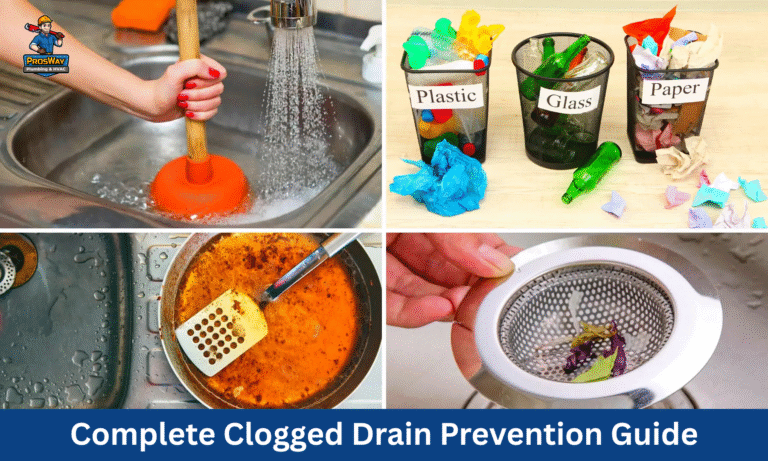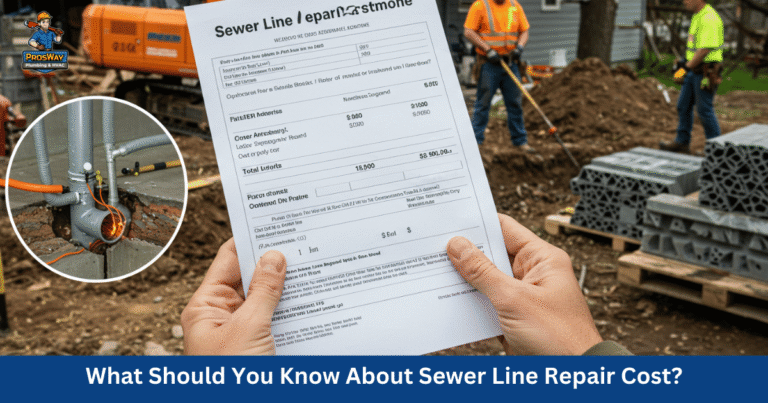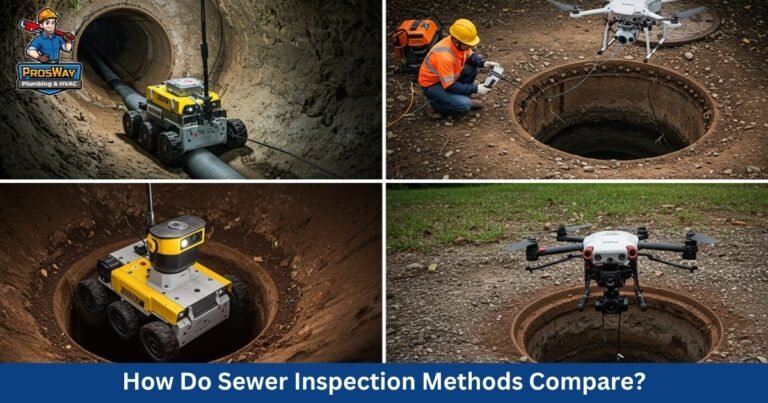Are slow-draining sinks becoming a nuisance in your home? Recognizing the early signs of a clogged drain can help prevent bigger plumbing problems and costly repairs. Knowing how to identify slow sink drain issues guarantees that you can take quick action and keep your plumbing system running smoothly.
At ProsWay Plumbing & HVAC, we’re committed to helping homeowners in Parsippany maintain healthy, efficient drains. In this guide, we’ll cover common symptoms of slow drains, everyday habits that contribute to clogs, and effective tools for monitoring drain performance.
Key Takeaways
- Slow draining sinks can lead to water damage and unpleasant odors if not addressed promptly
- Regular drain cleaning helps maintain flow and mitigates the risk of clogs
- Common household activities significantly affect sink drainage efficiency and should be managed carefully
- Homeowners should monitor plumbing conditions regularly to prevent costly repairs and ensure proper function
- Professional intervention may be necessary for persistent drainage issues that DIY methods cannot resolve
Common Symptoms of a Slow Draining Sink
The answer to how to identify slow sink drain issues starts with symptoms. Several symptoms indicate a slow draining sink.
These include water backup and stagnation issues or unpleasant smells originating from confined debris. Also, observing slow water flow compared to normal and hearing gurgling sounds during drainage signal problems.
Visible debris or clogs around the drain area are further indicators. Recognizing these symptoms is key to prevent potential water damage in your home.
Identifying Water Backup and Stagnation Issues
Water backup and stagnation issues often indicate underlying problems within a sink’s drainage system.
When water fails to flow properly, it can lead to unpleasant odors rising from the plumbing system, creating an uncomfortable environment.
Homeowners should pay close attention to any signs of pooling water, as these could worsen into an emergency if left ignored.
| Symptoms of Slow Draining Sink | Potential Consequences |
|---|---|
| Water backup | Indicates blockage in drainage system |
| Stagnation | Can lead to unpleasant odors |
| Pooling water | May cause water damage to fixtures |
Noticing Unpleasant Odors and Their Causes
Unpleasant odors from a sink can often indicate problems with the drainage system. This issue may arise from remaining wastewater or a buildup of waste that affects the septic system. Consequently, it leads to a persistent headache for homeowners.
Regular drain cleaning can help reduce these odors and prevent clogs, ensuring that water flows freely and maintains a fresh environment.
| Odor Causes | Potential Issues |
|---|---|
| Lingering wastewater | Indicates possible blockage |
| Buildup of waste | Can lead to septic problems |
| Improper drain cleaning | May cause unpleasant odors |
Observing Sluggish Water Flow Compared to Normal
Observing sluggish water flow in a sink can be an indication of various underlying issues that require attention.
This decreased flow often results from blockages in the sewer line, which can lead to contamination and create health concerns if left unaddressed.
Homeowners, particularly senior members of the household, should be alert to these changes, as prompt action can help prevent further complications related to plumbing and sewage systems.
Examining Gurgling Sounds During Drainage
Gurgling sounds during drainage often indicate issues with the plumbing that may warrant immediate attention.
Such noises can signal air trapped in pipes, usually a result of pressure imbalances due to blockages or leaks in the system.
If these sounds are accompanied by a foul odor resembling sewer gas, it may suggest deeper problems that could affect the sink and connected fixtures like showers.
Ignoring these signs can lead to significant plumbing complications and should be addressed promptly to avoid further damage.
Recognizing Visible Debris or Clogs Around the Drain Area
Recognizing visible debris or clogs around the drain area is a straightforward way to identify slow sink drain issues.
This accumulation often signifies the need for professional drain cleaning, as it may indicate a deeper blockage requiring a thorough inspection.
Homeowners can start with a plunger to address minor clogs, but neglecting visible issues can lead to additional expenses if backing up in the tank occurs.
The sink does not drain slowly without reason. Everyday tasks can make the problem worse, and understanding this connection is key to fixing it.
Impact of Household Activities on Sink Drainage

Household activities can significantly influence sink drainage efficiency. Here’s the detail:
Analyzing the Effects of Food Waste Disposal
The disposal of food waste can significantly impact the efficiency of a kitchen sink drain. Common practices, such as rinsing leftover food down the sink, can contribute to clogs, especially when grease or fibrous materials are involved.
To maintain clear drains, homeowners can use natural solutions like vinegar to help break down buildup and encourage smoother flow.
| Food Waste Disposal Practices | Impact on Sink Drain |
|---|---|
| Rinsing grease down the drain | Leads to clogs and sluggish drainage |
| Disposing of fibrous materials | Contributes to blockages |
| Using vinegar for cleaning | Helps dissolve buildup and reduce odors |
the Role of Soap and Hair Accumulation
Soap and hair buildup in bathroom sinks can lead to significant drainage issues. These materials mix with waste and often create stubborn clogs, resulting in backup that can affect overall sewage flow.
Regular maintenance practices, such as using drain strainers and periodic cleaning solutions, are crucial in preventing these blockages and ensuring smooth drainage.
Evaluating Consequences of Chemical Drain Cleaners
Chemical drain cleaners can provide immediate relief for slow sink drain issues, but their long-term effects may pose significant risks.
These harsh substances can cause damage to plumbing systems, particularly older pipes, leading to additional complications and costly repairs.
Homeowners should consider alternative methods, such as natural cleaning solutions, to address clogs effectively while preserving the integrity of their plumbing.
Discovering Connections Between Plumbing Age and Drain Performance
The age of plumbing systems can have a profound impact on drain performance. As pipes age, they may develop corrosion or sediment buildup, which can lead to restricted flow and an increased likelihood of clogs.
Homeowners should regularly assess their plumbing inspection, particularly in older homes, to address any potential weaknesses before they worsen into significant drainage issues.
Household routines affect how well a sink drains. As seasons change, new challenges arise that can impact efficiency; understanding these factors is key.
Seasonal Factors Influencing Sink Drain Efficiency
Seasonal factors can notably influence sink drain efficiency. Below are the factors that affect sink drain efficiency:
Investigating the Role of Weather Conditions
Weather conditions can significantly impact the efficiency of sink drainage systems. For instance, heavy rainfall can cause increased water flow, potentially exposing existing clogs that may not have been noticeable during drier months.
Homeowners should be aware that seasonal changes can intensify sink drain issues, pushing the need for regular maintenance and inspections to avoid larger plumbing problems.
| Weather Condition | Impact on Sink Drain Efficiency |
|---|---|
| Heavy Rainfall | Increased flow may expose hidden clogs |
| Cold Weather | Can cause pipes to freeze, hindering drainage |
| Dry Seasons | May reveal existing slow drainage issues |
Recognizing Tree Roots and External Elements
Tree roots can pose a significant challenge to sink drainage efficiency. As roots grow in search of moisture, they can infiltrate underground pipes, leading to blockages that disrupt water flow.
Homeowners should remain vigilant to signs of slow drainage, as this often indicates potential external elements, like tree roots, affecting the plumbing system, requiring timely professional inspection.
Monitoring Changes During Home Renovations
During home renovations, monitoring changes in sink drainage should be a priority for homeowners. Disturbances in plumbing can easily cause slow drain issues, especially when pipes are shifted or connections are disrupted.
After any major work, a thorough inspection of drainage efficiency can prevent future problems and ensure that the plumbing systems continue to function properly.
Seasons change, and so do the challenges of keeping drains clear. Now, it’s time to explore the tools and techniques that will help maintain drain performance year-round.
Tools and Techniques for Monitoring Drain Performance
Utilizing various tools and techniques can help identify slow sink drain issues effectively. A drain snake or auger a plunger can address minor clogs quickly.
Besides, a wet/dry vacuum proves useful. Also, regular maintenance with baking soda and vinegar can enhance drainage performance.
Using a Drain Snake or Auger for Exploration
A drain snake or auger can greatly assist in identifying slow sink drain issues. These tools are specifically designed to reach deep blockages that may be causing drainage problems and can effectively break apart clogs made of hair, grease, and other debris.
By inserting a drain snake into the sink drain, homeowners can often uncover the root of the issue and restore proper flow.
| Tool | Purpose |
|---|---|
| Drain Snake | Reaches deep blockages in drains |
| Auger | Breaks apart stubborn clogs |
| Plunger | Adds pressure to clear minor clogs |
Implementing a Plunger for Minor Clogs
Applying a plunger for minor clogs is a straightforward and effective method to address slow sink drain issues.
Homeowners can use this tool to create pressure that removes the blockage, restoring proper water flow in a matter of minutes.
To achieve the best results, it is essential to cover the overflow drain and create a firm seal around the sink’s drain before plunging with steady force.
- Gather necessary tools, including a plunger
- Ensure the overflow drain is covered for effective sealing
- Apply steady pressure while plunging to dislodge clogs
Using a Wet/Dry Vacuum for Debris Removal
Using a wet/dry vacuum can be an effective solution for removing debris that contributes to slow sink drain issues.
This powerful tool excels at sucking up water and solid particles, making it ideal for clearing minor clogs and preventing further drainage problems.
That said, homeowners should operate the vacuum according to the manufacturer’s instructions. This is to confirm all debris is properly cleared from the sink and its surrounding environment, thus maintaining optimal flow in their plumbing system.
Employing Baking Soda and Vinegar for Maintenance
Using baking soda and vinegar for maintenance can be an effective method to address slow sink drain issues.
This natural combination works to break down buildup in the pipes, helping to ease smoother drainage and reduce unwanted smells.
The regular use of this mixture can proactively maintain the plumbing systems, ensuring that minor clogs are cleared before they worsen into more significant problems.
Even with the right tools, some drains remain stubborn. Knowing when to call for help can save time and trouble when issues linger. Need a visual guide? Check out this video on How To Unclog Drain for Practical DIY solutions!
Seeking Professional Help for Persistent Problems
Identifying slow sink drain issues may require professional intervention at times. An awareness of when to call a plumber is crucial for homeowners facing persistent drainage problems.
Evaluating the costs and benefits of professional services can guide decisions, along with a review of common drain repair techniques.
Identifying When to Call a Plumber
Homeowners should consider calling a plumber when slow drain issues persist despite attempted DIY solutions for fast drain cleaning.
Clear signs such as constant backups, gurgling noises, or prolonged sluggishness suggest underlying plumbing problems that may be more complex than simple clogs.
Addressing these issues instantly with professional help can prevent further damage and costly repairs to the plumbing system:
- Persistent slow drains after DIY efforts
- Frequent backups or unusual gurgling sounds
- Visible leaks or pipe corrosion
Evaluating Costs and Benefits of Professional Services
When evaluating the costs and benefits of professional plumbing services for slow sink drain issues such as clogged drain, homeowners must consider both immediate expenses and potential long-term savings.
Professional interference can effectively address hidden problems that DIY attempts may overlook, thus preventing costly water damage and extensive plumbing repairs down the line.
Additionally, skilled plumbers possess the expertise and specialized tools necessary to resolve complex drainage issues safely and efficiently. This provides peace of mind that the problem is addressed correctly.
Researching Local Plumbing Experts and Their Specializations
Researching local plumbing experts involves looking for professionals who specialize in drain issues, particularly slow sink drains.
Homeowners can benefit from reviews and ratings to measure the reputation of plumbing services within their community.
Additionally, it is advisable to inquire about their experience with specific plumbing problems, such as persistent clogs and backup issues, as this knowledge can ensure effective solutions are tailored to individual needs.
Why Northern New Jersey Trusts ProsWay Plumbing and HVAC?
When it comes to slow sink drains, timely intervention is key. At ProsWay Plumbing and HVAC, we’re committed to delivering top-notch plumbing solutions for homeowners in Parsippany, Morristown, Montville, and beyond.
With years of experience, modern tools, and a dedication to customer satisfaction, we’re the trusted choice for all your plumbing and HVAC needs.
Preventative Measures to Maintain Optimal Drain Function
Keeping your drains clear and functioning properly requires regular maintenance and good habits. Here are some simple but effective preventative measures:
- Regularly Clean Sink Drains & Traps: Use natural cleaners like baking soda and vinegar to break down buildup. Establish a routine cleaning schedule to prevent slow drainage.
- Dispose of Food & Waste Properly: Avoid pouring grease, fibrous materials, or food scraps down the drain. Use a compost bin or waste disposal system to minimize debris buildup.
- Educate Household Members on Drain Etiquette: Teach proper disposal habits to prevent unnecessary clogs. Use sink strainers to catch food particles and debris.
- Schedule Routine Drain Inspections: Identify and address early signs of clogs, leaks, or buildup. Professional inspections help prevent costly plumbing issues before they escalate.
Conclusion
Identifying slow sink drain issues is key for preventing potential plumbing complications and ensuring the proper functioning of household systems. Homeowners should be vigilant in recognizing symptoms like water backup, unpleasant odors, and unusual sounds that indicate underlying problems. Regular maintenance and careful disposal of materials can significantly reduce the risk of clogs, while seeking professional help for persistent issues ensure effective solutions.
Call ProsWay Today!
Don’t let a slow sink drain disrupt your daily life or lead to more serious plumbing issues. Contact ProsWay Plumbing and HVAC today for fast, reliable service in Northern New Jersey. We’re here to ensure your home’s plumbing system is running smoothly year-round.Call Us Now at (862) 260-5870 or Book Online to schedule your appointment!









